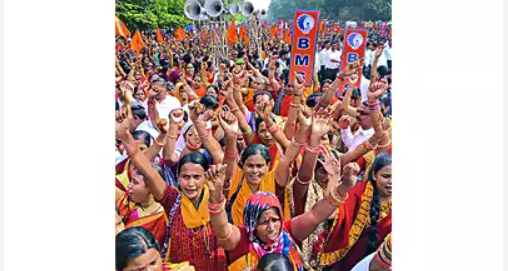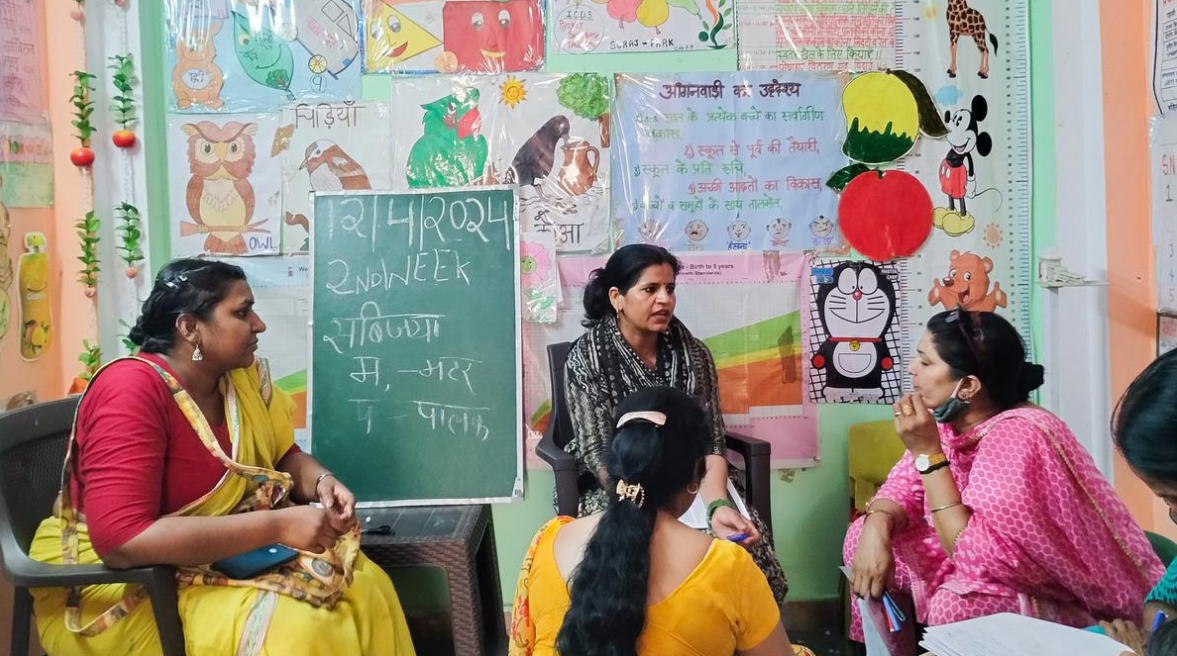Anganwadi Workers in the Capital
In the vibrant tapestry of Indian democracy, where the voices of the marginalized and the disempowered echo through the corridors of power, the role of grassroots workers such as Anganwadi workers holds immense significance. As the nation gears up for the Lok Sabha elections, the collective stand taken by Anganwadi workers in the capital to boycott major political parties – AAP, BJP, and Congress – for their failure to meet their longstanding demands illuminates the simmering discontent and the quest for dignity and recognition. This article delves into the grievances of Anganwadi workers, the political apathy they face, and the implications of their boycott on the electoral landscape.
Anganwadi Workers: The Backbone of Social Welfare: Anganwadi workers, often hailed as the unsung heroes of India’s social welfare system, play a pivotal role in delivering essential services to women and children in urban and rural areas. From providing nutrition and healthcare services to facilitating early childhood education and empowerment initiatives, Anganwadi workers serve as frontline warriors in the battle against malnutrition, illiteracy, and maternal mortality. Despite their invaluable contributions, Anganwadi workers continue to grapple with meager wages, lack of social security, and inadequate recognition of their work.
Grievances and Demands: The grievances of Anganwadi workers are multifaceted and longstanding, ranging from low wages and irregular payment to insufficient infrastructure and lack of basic amenities. Despite their tireless efforts to uplift the most vulnerable sections of society, Anganwadi workers find themselves at the mercy of bureaucratic red tape and political indifference. Their demands for fair wages, regularization of employment, and dignified working conditions have been met with lukewarm responses from successive governments, exacerbating their frustration and disillusionment.  watch video for more info
watch video for more info
AAP’s Promise of Change: In the run-up to the Lok Sabha elections, the Aam Aadmi Party (AAP) emerged as a beacon of hope for Anganwadi workers, promising to address their grievances and prioritize their welfare. With its populist rhetoric and emphasis on grassroots governance, AAP garnered significant support from Anganwadi workers who saw in the party a champion of their cause. However, as the AAP-led government failed to deliver on its promises and fulfill the demands of Anganwadi workers, disillusionment and resentment began to simmer within the community.
BJP and Congress: Legacy of Neglect: The Bharatiya Janata Party (BJP) and the Indian National Congress, the two major political parties vying for power in the Lok Sabha elections, have a legacy of neglect when it comes to addressing the concerns of Anganwadi workers. Despite being in power at the state and central levels, both parties have failed to enact substantive reforms or allocate adequate resources for the welfare of Anganwadi workers. Their tokenistic gestures and empty promises have only served to deepen the sense of disillusionment and alienation among the community.
The Decision to Boycott: Faced with the apathy of political parties and the indifference of policymakers, Anganwadi workers in the capital have taken a collective stand to boycott the Lok Sabha elections. Their decision to abstain from voting sends a powerful message to the political establishment, signaling their discontent and disenchantment with the status quo. By refusing to endorse any political party that fails to meet their demands, Anganwadi assert their agency and demand accountability from those in power.
Implications for the Electoral Landscape: The boycott of Anganwadi workers in the capital carries significant implications for the electoral landscape, underscoring the widening gap between political rhetoric and ground realities. In a democracy where every vote counts, the disenfranchisement of a crucial segment of the electorate sends a stark warning to political parties about the perils of neglecting the aspirations and grievances of the marginalized. It also underscores the urgent need for systemic reforms and genuine efforts to address the structural inequalities that perpetuate social injustice and economic disparity. ALSO READ: Homecoming: A Journey of Hope and Resilience – The Story of an Indian Crew Member Returning from Iran-Seized Vessel
Conclusion: In conclusion, the decision of Anganwadi workers in the capital to boycott major political parties in the Lok Sabha elections reflects the deep-seated frustration and disillusionment pervading India’s social welfare system. It serves as a wake-up call to policymakers and political leaders, urging them to heed the voices of the marginalized and prioritize their welfare over partisan interests. As the nation embarks on yet another electoral journey, the boycott of workers resonates as a poignant reminder of the unfinished agenda of social justice and inclusive governance that lies at the heart of India’s democratic experiment.






Эта информационная заметка предлагает лаконичное и четкое освещение актуальных вопросов. Здесь вы найдете ключевые факты и основную информацию по теме, которые помогут вам сформировать собственное мнение и повысить уровень осведомленности.
Ознакомиться с деталями – https://quick-vyvod-iz-zapoya-1.ru/